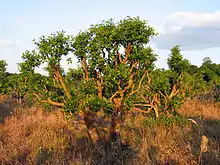yerba
English

A yerba bush
Etymology
From yerba mate.
Noun
yerba (usually uncountable, plural yerbas)
- Ilex paraguariensis, a species of holly native to southern South America; or the dried leaves and twigs of this plant, used to make the caffeine-rich beverage mate.
See also


Aragonese
References
- Bal Palazios, Santiago (2002), “yerba”, in Dizionario breu de a luenga aragonesa, Zaragoza, →ISBN
Spanish
Etymology
From Latin herba, from Proto-Indo-European *gʰreH₁- (“to grow, become green”).
Pronunciation
- IPA(key): /ˈɟ͡ʝerba/, [ˈɟ͡ʝerβa]
Noun
yerba f (plural yerbas)
- yerba (Ilex paraguaiensis)
- Alternative form of hierba
- 1605, Miguel de Cervantes, El ingenioso hidalgo Don Quijote de la Mancha, Primera parte, Capítulo XX
- No es posible, señor mío, sino que estas yerbas dan testimonio de que por aquí cerca debe de estar alguna fuente o arroyo que estas yerbas humedece;
- It cannot be, my lord, but that this grass gives proof that there must be nearby some spring or brook to give it moisture;
- No es posible, señor mío, sino que estas yerbas dan testimonio de que por aquí cerca debe de estar alguna fuente o arroyo que estas yerbas humedece;
- 1605, Miguel de Cervantes, El ingenioso hidalgo Don Quijote de la Mancha, Primera parte, Capítulo XX
Derived terms
- yerba buena
- yerba dulce
- yerba mate
- enyerbar
- yerboso
This article is issued from Wiktionary. The text is licensed under Creative Commons - Attribution - Sharealike. Additional terms may apply for the media files.